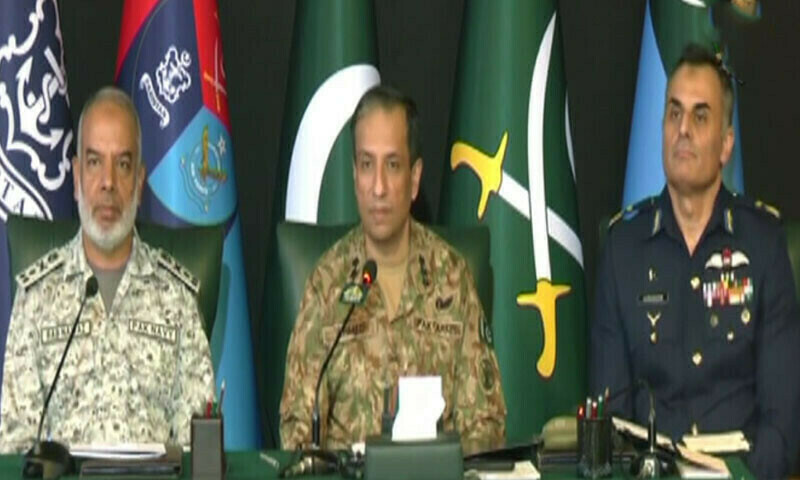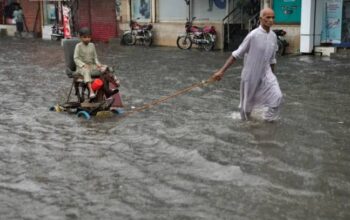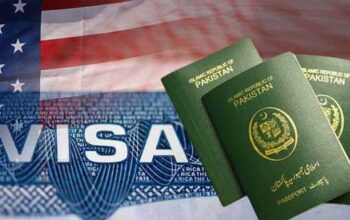By Staff Reporter
ISLAMABAD The military rejected claims that it sought a ceasefire during last week’s fierce clashes with India, the deadliest in decades between the two nuclear-armed rivals, asserting that it was New Delhi who requested a halt to the fighting after launching missile strikes into Pakistani territory.
“Let me put it on record, Pakistan never requested a ceasefire,” Lt. Gen. Ahmed Sharif Chaudhry, Pakistan’s military spokesperson, told reporters on Sunday night in a press briefing. “On the night of May 6 and 7, after those dastardly and cowardly attacks were made, Indians requested a ceasefire and Pakistan gave a very clear response, that we will communicate back only after we have given the response that this act deserves.”
The statement came as a fragile, US-brokered ceasefire teeters, with fresh reports of artillery fire in the disputed Kashmir region.
The escalation began with an attack on April 22 in Pahalgam, a resort town in occupied-Kashmir, where 26 tourists were killed. India swiftly pointed the finger at Pakistan, alleging Islamabad’s backing of the assault, a charge Pakistan has dismissed as baseless. Islamabad offered an independent and credible international investigation.
Tensions boiled over last Wednesday when India retaliated with missile strikes on multiple Pakistani cities. Pakistan downed five Indian fighter jets in response.
What followed was four days of relentless combat, with both sides deploying fighter jets, missiles, drones, and artillery in a barrage that claimed nearly 70 lives and displaced residents along the border.
The clashes, unmatched since the 1999 Kargil War, underscore the Kashmir dispute’s volatility, a territory split since 1947, yet fully claimed by both nations.
The fighting ceased only on Saturday evening, when U.S. President Donald Trump announced a surprise ceasefire, a deal forged through intense diplomatic efforts as the conflict threatened to spiral further.
Chaudhry provided a rare glimpse into Pakistan’s military response, codenamed “Operation Bunyan-um-Marsoos” and described the counter-offensive as a precise and restrained operation that targeted 26 Indian military facilities while dozens of Pakistani drones loomed over major Indian cities, including New Delhi.
“Pakistan’s military response has been precise, proportionate, and still remarkably restrained,” the military spokesperson said. “It was carefully calibrated to avoid civilian casualties, and it exclusively targeted those entities and facilities which were directly involved in orchestrating and executing cold-blooded killings of Pakistani civilians.”
He listed key targets, including Indian Air Force bases at Suratgarh, Sirsa, Poonch, Naliya, Adampur, Bathinda, Barnala, Halwara, Awantipura, Srinagar, Jammu, Udhampur, Mamoon, Ambala, and Pathankot, saying they suffered “significant damage.”
Pakistan also disabled India’s S-400 missile defenses at Adampur and Poonch, using Fatah-1 and Fatah-2 missiles, long-range artillery, and cyber attacks that disrupted Indian military systems without affecting civilians. “S-400 missile systems at Adampur and Poonch were also neutralised by the Pakistan Air Force.”
“Precision-guided long-range missiles— Fatah-1 and Fatah-2— were employed by the Pakistan Army, while the Pakistan Air Force utilized highly capable long-range munitions and precision-guided weaponry,” he said. “Long-range artillery units also contributed significantly to the strike package.”
Chaudhry said armed forces also carried out comprehensive and effective cyber offensives, temporarily crippling and degrading critical Indian military infrastructure and services. “These cyber strikes targeted systems directly supporting Indian military operations and were designed to disrupt their warfighting capabilities without affecting civilian platforms.”
In response to a question, the military spokesperson confirmed that no Indian pilot was in Pakistan Army’s custody following military clashes. “I can confirm you that we do not have any pilot in custody, this is all social media chatter, this is all part of multiple sources of fake news and propaganda.”
Despite the truce, reports of artillery fire in Kashmir surfaced within hours, prompting violation allegations. Chaudhry dismissed them. “I can say with 200 percent conviction that we have not done any ceasefire violation.”
Chaudhry underscored the operation as a testament to Pakistan’s unified national resolve, calling it “a great example of coming together of all elements of Pakistan’s national power to effectively counter the threat to national sovereignty and integrity.”
He cautioned that any future incursions would meet a similar fate. “No one should have any doubt that whenever our sovereignty would be threatened and territorial integrity violated, the response would be comprehensive, retributive, and decisive.”
Still, Chaudhry called the notion of all-out war between two nuclear powers “absurd and inconceivable.” Pakistan’s restraint, he argued, was evident in its focus on military targets alone, avoiding civilian harm despite the intensity of India’s initial strikes.
Copyright © 2021 Independent Pakistan | All rights reserved




